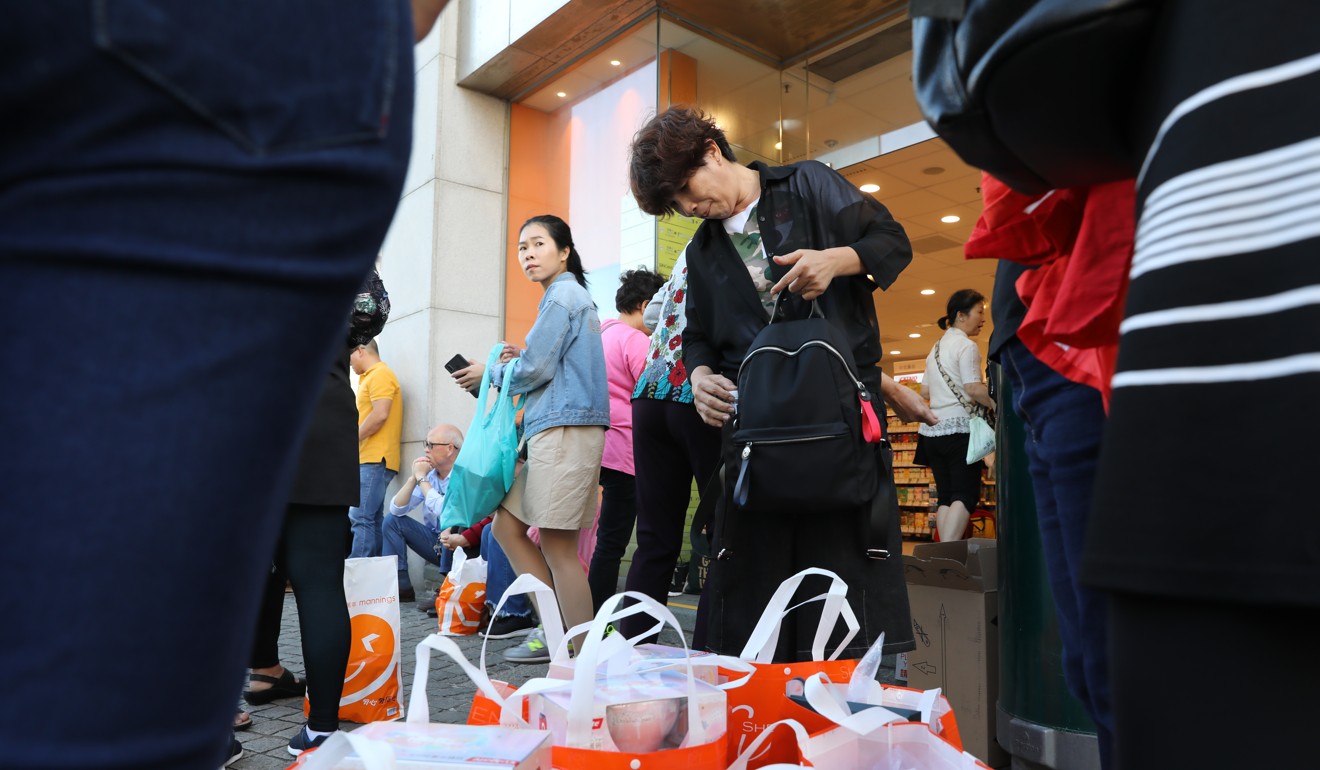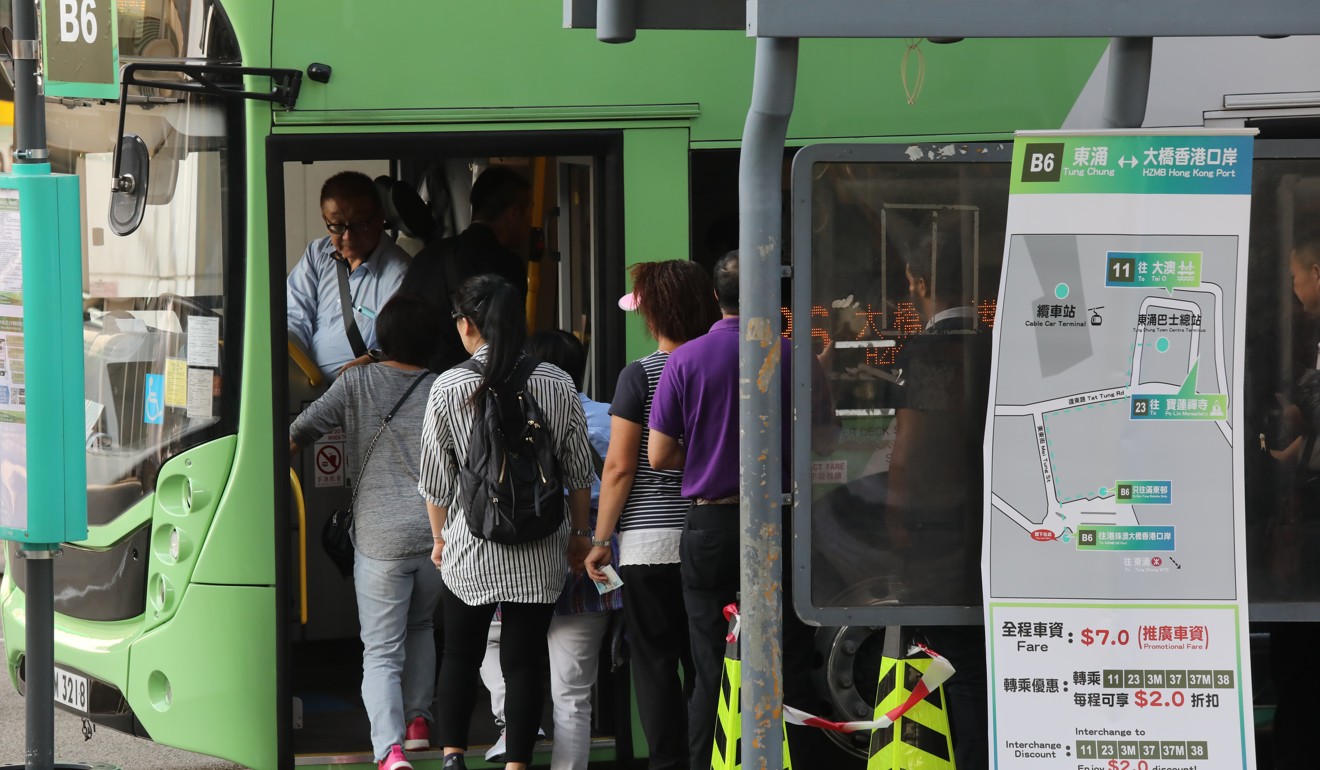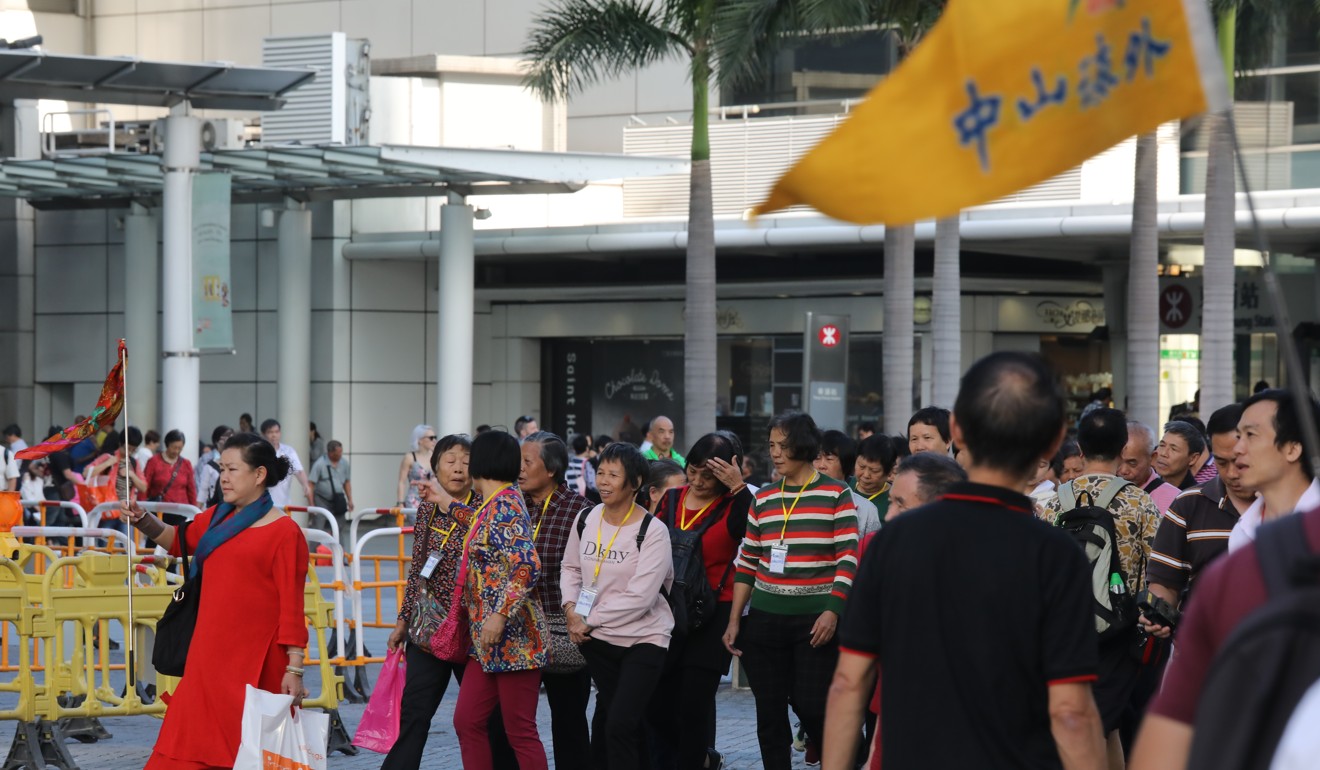
Hong Kong asks Guangdong authorities to investigate alleged illegal tour operators after influx of day trippers overwhelms quiet suburb of Tung Chung
- More than 100,000 people passed through the Hong Kong port of the new mega bridge on Sunday, causing chaos in nearby town
- Industry insiders believe many of the visitors who thronged the town were with tour operators who avoided liaising with Hong Kong agencies
Hong Kong asked Guangdong authorities on Monday to investigate mainland tour agents allegedly operating illegally in the city after an unexpected number of travellers crossed the border via the new mega bridge and caused chaos in the tranquil suburb of Tung Chung.
Local officials revealed the move amid fears that the grievances of the affected Tung Chung residents would heighten mainland-Hong Kong tensions, with some localist groups warning on Monday to “reclaim” the district if the problems were not resolved soon.
Commerce secretary Edward Yau Tang-wah said the Tourism Commission and Travel Industry Council were liaising with their Guangdong counterparts for better coordination over mainland tour groups visiting Hong Kong.

A record number of more than 100,000 people passed through the Hong Kong port of the 55km Hong Kong-Zhuhai-Macau Bridge on Sunday, many of them on day trips, pouring into Tung Chung for shopping, sightseeing and dining that sparked an outcry from its residents.
The tourists mainly took public transport, which placed a heavy burden on buses such as the B6 line.
Some residents and lawmakers fear the district will become so swamped that it will meet the same fate as the northern New Territories border town Sheung Shui, which was plagued by parallel traders sourcing tax-free goods for sale across the border for a profit in 2012, triggering protests and souring mainland-Hong Kong relations.
‘Super attraction’ shows gap between Hong Kong and mainland tourists
Wong Chun-yeung of online community Tung Chung Future said he was told by certain groups that they were ready to take actions similar to the previous protests to “reclaim” Sheung Shui, should the situation persist.
Wong declined to name the groups, but said they were not necessarily made up of local residents.
He urged the government to take measures to ease disturbance to residents within a week.
Students Independence Union, which advocates for Hong Kong independence, on Monday called for a “battle” to defend Tung Chung via a social media post, but had no plans to stage protests in the area.
Political commentator Lau Yui-siu said the government should not underestimate the issue, though he was not expecting escalated actions immediately.

“The atmosphere is different now … the level of discontent with the government is not as serious,” Lau said, adding that the anti-parallel trading protests were rooted in people’s dissatisfaction with the previous administration.
Lau, however, warned that future political issues could reignite the sentiment and give rise to more radical protests in Tung Chung.
Yau said the unexpected influx was related to some tour groups which failed to comply completely with the regulations.
Transport and Housing Bureau chief Frank Chan Fan said the government mobilised about 2,000 port-to-port shuttle buses to ease crowds on Sunday.
“The most important consideration is to strike a balance between Tung Chung residents’ daily lives and the safety of passengers taking the B6 bus [connecting the district and the Hong Kong port],” he said.
The bridge – the world’s longest sea crossing – has become a tourist hotspot since it was opened to traffic on October 24.
On Monday, about 35,000 people had crossed the bridge through the Hong Kong port as of 4pm, down from 102,919 on Sunday, according to the Immigration Department.
Jason Wong Chun-tat, chairman of the Travel Industry Council and owner of Hong Thai Travel Services, said mainland travel agents were supposed to contact their Hong Kong counterparts in advance, so local agents could take over once visitors passed the port area.
Southern Lantau Island hot property thanks to mainland bridge
He said an arrangement requiring mainland operators to register with local authorities would offer better protection for travellers and enable the council to follow up on any complaints.
Wong said he believed that many of the mainland tourists who thronged Tung Chung had joined tour groups that skipped liaising with Hong Kong agents. Their tour guides mainly brought them from the port area to Tung Chung on the B6 bus route to shop and walk around for a few hours before returning home.
Tung Chung may end up just like Sheung Shui
Tung Chung, located next to Hong Kong International Airport, is the residential zone closest to the bridge checkpoint, which is situated on an artificial island north of Lantau.
Residents complained their peaceful community was becoming like Sheung Shui, as shopping malls were flooded with tourists.
“Of course it is very annoying, I have been living here since 2003. Back then, when I took the MTR to the city centre, it was very quiet. Now, it’s always packed,” said resident George Ho, 71.
“It’s very troublesome to get a place to eat at the restaurants. You have to queue for so long. Tung Chung may end up just like Sheung Shui.”
He said there were about 1,000 tourists waiting for the bus to the bridge on Saturday.
Another resident, Tsang Ka-chung, said Tung Chung has become so packed with tourists it was “unacceptable”.
The 41-year-old said there were tourists who walked into Tung Chung Crescent, the private estate where he lives, and asked to use the toilets. He was planning to lodge a complaint to the estate management.
“They’ve been a real nuisance,” said Tsang, who has lived in Tung Chung for about 15 years. “I moved here because Tung Chung was a quiet place, and because property prices were not high. Now I want to move to somewhere else. But the problem is property prices are high elsewhere.”

On Monday afternoon, the area where tourists board the bus to the bridge was not as packed as it was over the weekend. Some were sitting outside the shops to kill time.
A tour operator from Zhongshan said she has about 10 tours to Hong Kong crossing the new bridge every day.
Her group of 40 tourists left Zhongshan at 7am on Monday, crossed the bridge, rode the Ngong Ping 360 cable car, visited the Big Buddha, and went shopping at the Citygate mall, before crossing the bridge back to Zhongshan.
Sheung Shui parallel-traders protest descends into chaos
The wait to take the cable car was an hour-and-a-half long, she said.
“On Sunday, we left Tung Chung at 6pm. By the time I was back in Zhongshan, it was around 11pm,” she said, saying the queues to use public buses to cross the bridge were long.
She said that her agency would use public buses for small groups, and tour coaches for big ones.
The tour fee for her one-day tour is about 400 yuan (HK$453).
A search on mainland search engine Baidu shows many offers for one-day tours over the bridge to Tung Chung on Lantau Island, ranging from 128 to 488 yuan.
These tour guides are effectively operating in Hong Kong as illegal workers
These tour groups do not contain any itineraries and cover basic transport such as cross-border shuttle bus services between the Hong Kong and Zhuhai ports, but tour guides were leading tourists in Hong Kong.
“These tour guides are effectively operating in Hong Kong as illegal workers,” tourism lawmaker Yiu Si-wing said. “The Security Bureau should step up checking whether there are any mainland tourist agents operating illegally in Hong Kong.”
Li Xieju, vice-president of industry body the Guangdong Province Tourism Association, said “the spectacular bridge” had become a big tourist draw since its opening and urged tourists to join authorised tourist agents.
“It is possible some tourists are joining groups organised by unauthorised agents, which I believe are minorities,” he told the Post. “Tourists should verify the legality of tour agents so that their consumer rights are protected.”
He added that the association would communicate with its Hong Kong counterparts for better coordination of mainland tour groups in Hong Kong.
Additional reporting by Tony Cheung



